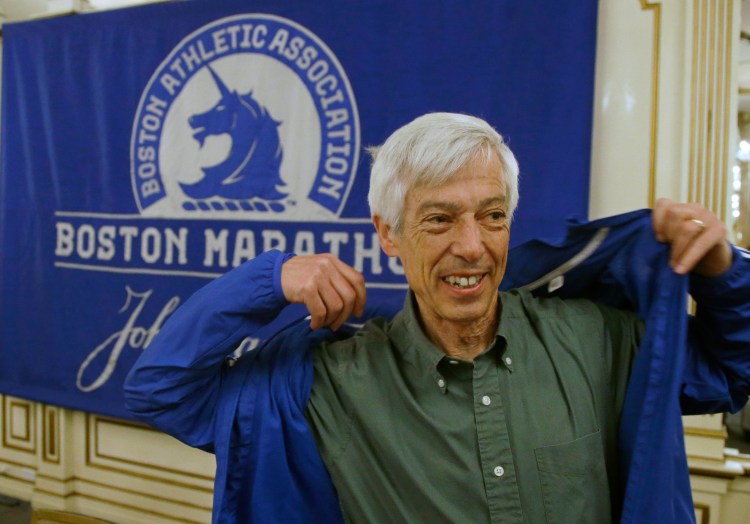BOSTON — Ben Beach was a scrawny 18-year-old who had never run more than five miles before he started training for his first Boston Marathon in 1968.
A half-century later, at age 67, the Bethesda, Maryland, resident plans Monday to become the first person to complete 50 straight trips on the course.
The current Cal Ripken of the Boston race is one of just 81 people who have current streaks of at least 25 consecutive trips down the 26.2-mile Boston route. Only nine have a streak of at least 40.
Beach’s love affair with the event began on a whim. He was a high school senior flipping through radio stations in his bedroom at a Massachusetts boarding school when he came across a broadcast of the 1967 marathon. The race was run in low 30-degree weather and sleet. Set to attend Harvard the following year, he perked up.
“The whole idea of running 26 miles in that kind of weather just kind of appealed to my senses – the bizarre,” he said. “I just said to myself that day … I’m gonna run that.”
He signed up in 1968.
He walked inside the staging area “that reeked of Bengay.” The field of 1,014 that year only had a handful of women who had signed up a year after Katherine Switzer became the first woman to officially enter.
Beach, who ate a steak the night before and ran 20 miles only two days prior, said he was naive about marathon prep.
“You got in line for the doctor and when you got up to the front … the doctor puts a stethoscope to try to determine if you could make it to the Prudential Building (finish line),” Beach said. “I don’t know if anybody got turned down or what.”
He did finish, in 3 hours, 23 minutes, and after waiting in line to use the only available shower went up to the cafeteria for a bowl of beef stew. He didn’t finish that but did get down four glasses of milk.
“I was lucky that I didn’t collapse in a heap,” he said.
He wasn’t sure he’d do it again.
“In fact, my initial feeling was ‘I’ve done it, that’s it,’ ” he said. “But at some point over the next few weeks or months I think I decided I ought to go back … It went better than anything I could have imagined.”
James Fallows, a friend of Beach’s at Harvard, ran with him the following year and again in 1970.
“I had no idea that I was witnessing the beginnings of something historic,” Fallows said. “It was like having been on hand to see the planting of the seed that became a giant sequoia.”
It was around Year 10 that Beach said it really started to become a streak. It was also around the time – in 1977 – that he met Carol, his future wife, at a road race.
She said his drive to run was an instant attraction.
There have been early and recent challenges to the streak.
The first time was on just his fourth race in 1971. He had a knee injury and was just passing the third mile when it started to give him trouble. But he was able to push through and finish.
But the last 10 years have become particularly challenging following his diagnosis for a movement disorder called Dystonia in 2002. It causes involuntary and uncontrollable muscle contractions, and cramping.
At first it wasn’t too debilitating because of the large mileage base he built over the years. But 10 years ago as he aged and his training began to tail off, it finally caught up with him.
In 2002, he finished the course in 3:07:50. By 2012, his time had ballooned to 5:55:22. That was twice his best time ever in Boston of 2:27:26 in 1981.
The 2012 finish was also the start of five straight years of times above five hours. That included the 2013 bombing year, when he surpassed former record-holder Neil Weygandt’s streak of 45. Beach had just passed 21 miles when the bombs halted the more than 5,000 runners still on the course. He was later given an extrapolated finish of 5:39:32. He finished last year in 5:31:21.
Race officials notified runners in 2015 of a change in streak recognition. Now, only participants who completed the course before the official clock cutoff at six hours would have the continuation of their streaks recognized.
Though his health certainly will play a role in where the streak goes from here, he said Johnny Kelley’s record of 58 total Boston finishes always has been in the back of his head.
“As long as I’m physically able I’d go back the next year because again, it’s in my blood,” he said. “I’m not on a suicide mission here, though. If it really looks like I’m putting myself in serious risk, then I think I’ll have the common sense to say it’s been great, but all good things must come to an end.”
Send questions/comments to the editors.



Success. Please wait for the page to reload. If the page does not reload within 5 seconds, please refresh the page.
Enter your email and password to access comments.
Hi, to comment on stories you must . This profile is in addition to your subscription and website login.
Already have a commenting profile? .
Invalid username/password.
Please check your email to confirm and complete your registration.
Only subscribers are eligible to post comments. Please subscribe or login first for digital access. Here’s why.
Use the form below to reset your password. When you've submitted your account email, we will send an email with a reset code.